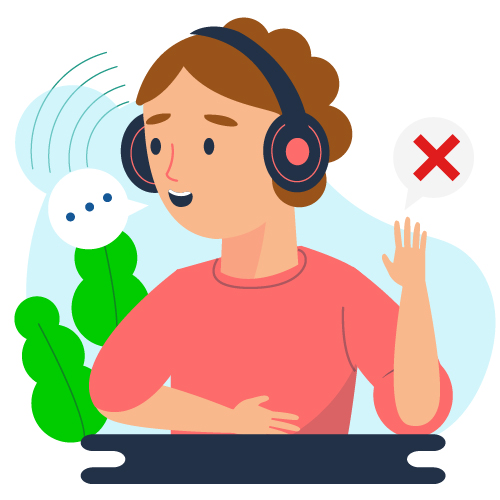All about IELTS syllabus
There are various IELTS exam versions. The two most commonly utilized subtypes are IELTS General Training and IELTS Academic. Candidates must approach their IELTS preparation with the syllabus and exam style in mind. Listening, Reading, Writing, and Speaking will all be needed for the IELTS exam in 2023. The IELTS General Training and IELTS Academic hearing and reading components of the IELTS curriculum 2023 will remain unchanged. However, the exam content for the speaking and listening parts will be different. The IELTS is designed to assess a candidate’s ability with the English language in academic, professional, and social situations. The IELTS exam uses a special 9-band scale to convey scores.
Types of IELTS Before diving into the syllabus and exam format, let’s quickly review the different IELTS tests:
Academic If IELTS candidates intend to apply for higher education or professional registration in countries where English is the primary language of communication, they should take the IELTS Academic exam. The test’s main objective is to ascertain if a candidate is prepared to start studying or training in English.
General Training IELTS
IELTS General Training is intended for those who wish to immigrate to an English-speaking nation such as Australia, New Zealand, the United States, or the United Kingdom, Canada or who need to submit an application for secondary education, training, or employment. This examination focuses on a candidate’s basic survival skills in a variety of social and occupational circumstances.
| IELTS test component | Brief description | Time duration |
|---|---|---|
| Listening (Same for Academic and General Training) | Four sections, 40 items | 30 minutes |
| Reading (Different for Academic and General Training) | Three sections, 40 items | 60 minutes |
| Writing (Different for Academic and General Training) | Two tasks | 60 minutes |
| Speaking (Same for Academic and General Training) | Three-part one-on-one conversation | 11-14 minutes |
IELTS 2023 Syllabus – Listening
The Listening portion of the IELTS syllabus 2023 is divided into four sub-sections. The first shows a dialogue between two people taking place in a typical social setting. The second section’s speech or monologue. The third portion is a debate between up to four people in an academic setting, and the last is a monologue on an intellectual subject, such as an academic lecture. Every section is heard only once. Candidates are allowed to take notes throughout the discussions and lectures, which they can subsequently use to guide their replies to the questions.
IELTS Reading Syllabus
According to the IELTS syllabus 2023, the IELTS Reading section assesses test-skill taker’s in reading by asking them to answer questions after reading passages (sentence completion, multiple-choice, matching information, , summary writing, short answers, etc.). There are a total of 40 questions in this part, with 13–14 questions for each passage. Utilizing a variety of question types, such as reading for gist, reading for important concepts, reading for detail, skimming, comprehending the logical argument, and recognising writers’ viewpoints, attitudes, and intent, a wide range of reading abilities are examined. IELTS provides distinct reading passages and question types for academic and general training.
IELTS Academic 2023 Syllabus – Reading
The Academic edition of the IELTS curriculum for 2023 consists of three lengthy texts with a variety of topics, from argumentative to factual to descriptive. The texts were gathered from books, journals, periodicals, and newspapers, and they are real. These were chosen for a general readership but are suitable for applicants to degree programmes or looking for professional registration overseas.
IELTS General Training 2023 – Reading
The General Training version of the IELTS asks applicants to read passages from books, periodicals, newspapers, notices, advertising, corporate handbooks, and guidelines, according to the IELTS 2023 Syllabus. These are resources that one could regularly come across in a setting where the language of instruction is English.
IELTS Academic 2023 Syllabus – Writing
IELTS Academic’s writing section consists of two assignments. The topics are of wide interest and suited for applicants wishing to pursue undergraduate and graduate degrees abroad or who want to become registered professionals.
Task 1
Candidates will be shown a graph, table, chart, or other visual representation of information and asked to describe, summarize, or otherwise explain it in their own words. It is possible for test takers to be asked to describe and explain a set of facts, the steps in a process, a flowchart outlining how something operates, or even a specific object or event.
Task 2
Candidates would be required to respond in writing to a point of view, claim, or issue. Responses to both tasks must be made in an official, academic way. Arguments should be backed up by pertinent examples.
IELTS General Training 2023 – Writing:
There are two assignments in the IELTS Broad Training writing section that are focused on themes that are of general interest.
Task 1
Candidates will be given a circumstance to explain or ask for information, and they will be required to compose a letter in response. The letter’s style might be informal, official, or personal.
Task 2
Essay writing will be required of test-takers in response to a point of view, defense, or issue. The essay’s tone can be a little more intimate than the one for Academic Writing Task 2. Arguments should be backed up by relevant examples.
IELTS 2023 syllabus: Speaking:
The IELTS Speaking examination will be divided into three sections to replicate an in-person oral interview with an examiner and will be videotaped for assessment reasons, according to the IELTS 2023 curriculum. The Speaking section, which lasts 11 to 14 minutes, evaluates the applicants’ usage of spoken English. The examiner records the whole speaking examination. The Speaking section is administered in a way that prevents candidates from practicing their prepared answers beforehand.
Part 1
The examiner will enquire generally about the candidate as well as a variety of well-known subjects, including home, family, employment, studies, and interests. This section lasts between four and five minutes.
Part 2
Candidates will get a card that asks them to discuss a certain subject. Prior to speaking for up to two minutes, they will get one minute of preparation time. The examiner will next ask one or more questions on the same subject to wrap up the second part of the speaking test.
Part 3
Additional questions pertaining to the subject will be asked of test-takers in Part 2. Candidates will have the chance to talk about more esoteric concepts and concerns in response to these questions. This portion of the exam takes four to five minutes to complete.



